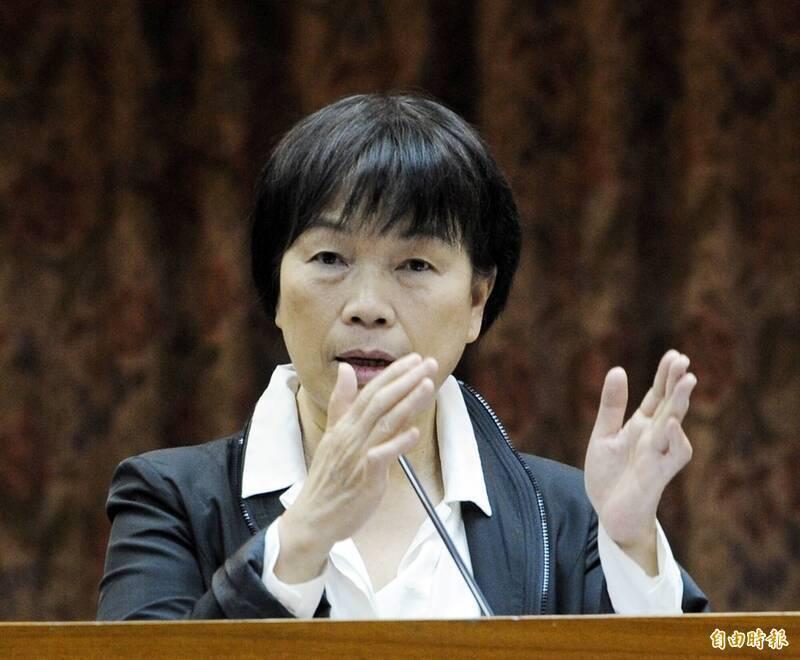It is time for Taiwan to “reconcile with China,” former minister of culture Lung Ying-tai (龍應台) said in a New York Times op-ed this week, criticizing the Democratic Progressive Party (DPP) and President William Lai (賴清德) for antagonizing China and stirring fear among Taiwan’s public.
Titled “The Clock is Ticking for Taiwan” and published on Tuesday, Lung said in her article that with US President Donald Trump “casting aside democratic values and America’s friends, Taiwan must begin an immediate, serious national conversation about how to secure peace with China.”
Lai’s “provocative labeling of China as an enemy ... [is] threatening peace and the progress Taiwan has made in building an open, democratic society,” she said.

Photo: Taipei Times
Lung said that relations with China were the best under former president Ma Ying-jeou (馬英九) of the Chinese Nationalist Party (KMT), when “reconciliation seemed possible.”
Lung served as Taiwan's first minister of culture from 2012-2014 under the KMT and is a prominent writer and cultural critic.
Since the DPP won the presidency in 2016, relations with China have “reverted to confrontation and fear,” she said.
“Fear breeds hatred and distrust,” she said, “to the point that even suggesting peace with China is dismissed in Taiwan’s political discourse as naïve, unpatriotic or — worse — as surrender and betrayal.”
Chinese-state media the Global Times published an article in response yesterday, echoing Lung’s criticism of Lai and the DPP.
The article said that while Lung misunderstood the nature of cross-strait relations, her criticism of Lai and the Taiwan independence movement resonate with the growing dissatisfaction in Taiwan.
Commenting on the articles, Taiwan’s representative to Germany Shieh Jhy-wei (謝志偉) said that Lung’s focus was not on reconciliation with China but rather blaming Lai for the current tensions in the Taiwan strait, which spreads false information to the international community.
“The provocations and disturbances come from China, not Taiwan,” Shieh said, claiming that Lung’s “anti-Taiwan stance has become so extreme.”
Lee Jung-shian (李忠憲), a professor at National Cheng Kung University, said “pandering to China is not peace, it is the illusion of kneeling down to survive.”
“Once you choose to be a slave, don't foolishly think you are qualified for peace,” Lee said.
Democracy is not the result of peace, but an extension of free will, he said, adding that only by living with dignity does peace have meaning.
Otherwise, it is a kind of “enslaved silence,” he said, a humble plea of “I will not resist, so please do not hit me.”

Three batches of banana sauce imported from the Philippines were intercepted at the border after they were found to contain the banned industrial dye Orange G, the Food and Drug Administration (FDA) said yesterday. From today through Sept. 2 next year, all seasoning sauces from the Philippines are to be subject to the FDA’s strictest border inspection, meaning 100 percent testing for illegal dyes before entry is allowed, it said in a statement. Orange G is an industrial coloring agent that is not permitted for food use in Taiwan or internationally, said Cheng Wei-chih (鄭維智), head of the FDA’s Northern Center for

LOOKING NORTH: The base would enhance the military’s awareness of activities in the Bashi Channel, which China Coast Guard ships have been frequenting, an expert said The Philippine Navy on Thursday last week inaugurated a forward operating base in the country’s northern most province of Batanes, which at 185km from Taiwan would be strategically important in a military conflict in the Taiwan Strait. The Philippine Daily Inquirer quoted Northern Luzon Command Commander Lieutenant General Fernyl Buca as saying that the base in Mahatao would bolster the country’s northern defenses and response capabilities. The base is also a response to the “irregular presence this month of armed” of China Coast Guard vessels frequenting the Bashi Channel in the Luzon Strait just south of Taiwan, the paper reported, citing a

UNDER PRESSURE: The report cited numerous events that have happened this year to show increased coercion from China, such as military drills and legal threats The Chinese Communist Party (CCP) aims to reinforce its “one China” principle and the idea that Taiwan belongs to the People’s Republic of China by hosting celebratory events this year for the 80th anniversary of the end of World War II, the “retrocession” of Taiwan and the establishment of the UN, the Mainland Affairs Council (MAC) said in its latest report to the Legislative Yuan. Taking advantage of the significant anniversaries, Chinese officials are attempting to assert China’s sovereignty over Taiwan through interviews with international news media and cross-strait exchange events, the report said. Beijing intends to reinforce its “one China” principle

A total lunar eclipse, an astronomical event often referred to as a “blood moon,” would be visible to sky watchers in Taiwan starting just before midnight on Sunday night, the Taipei Astronomical Museum said. The phenomenon is also called “blood moon” due to the reddish-orange hue it takes on as the Earth passes directly between the sun and the moon, completely blocking direct sunlight from reaching the lunar surface. The only light is refracted by the Earth’s atmosphere, and its red wavelengths are bent toward the moon, illuminating it in a dramatic crimson light. Describing the event as the most important astronomical phenomenon